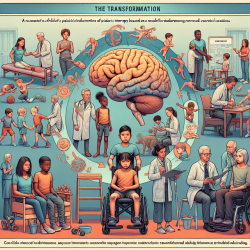In the realm of pediatric therapy, achieving optimal outcomes for children with neurological conditions requires a nuanced understanding of their unique needs. The research article "Development of a Chronic Care Model for Neurological Conditions (CCM-NC)" offers invaluable insights that can help practitioners refine their approaches and ensure that every child receives the highest quality of care.
Key Insights from the CCM-NC Study
The CCM-NC study, conducted by Jaglal et al. (2014), underscores the importance of a comprehensive, multi-faceted approach to managing neurological conditions. The study involved interviews with 180 stakeholders, including healthcare professionals, community-based non-healthcare professionals, and policymakers. Here are some critical takeaways:
- Acceptance and Openness to Neurological Conditions: The study highlights the need for societal acceptance and reduced stigma around neurological conditions. Practitioners can advocate for awareness campaigns and inclusive policies to foster a supportive environment for children and their families.
- Evidence-Informed Policy: The research calls for policies that are reflective of the needs of individuals with neurological conditions. This includes creating uniform policies across regions and ensuring they support seamless transitions and integration into the community.
- Investments and Funding: Adequate funding is essential for enhancing health and community-based services. Practitioners should be vocal about the need for investments in telehealth, caregiver support, and mental health programs.
- Supported Transitions: The transition from pediatric to adult care can be particularly challenging. Practitioners should focus on creating robust transition plans that ensure continuity of care and support for both the child and their caregivers.
- Caregiver Support: Caregivers play a pivotal role in managing neurological conditions. Providing them with the necessary training, education, and respite care options can significantly improve outcomes for children.
- Life-Enhancing Resources: Access to education, employment, housing, and transportation is crucial. Practitioners should work towards ensuring that children with neurological conditions have access to these essential resources.
Implementing the CCM-NC in Practice
To integrate these insights into your practice, consider the following steps:
- Advocate for Policy Changes: Work with local and national organizations to push for policies that support the needs of children with neurological conditions.
- Leverage Technology: Utilize telehealth services to reach children in rural areas and provide continuous care.
- Enhance Caregiver Training: Develop programs that equip caregivers with the skills they need to manage their child's condition effectively.
- Focus on Transitions: Create detailed transition plans that ensure children continue to receive the care they need as they move from pediatric to adult services.
Encouraging Further Research
While the CCM-NC provides a solid foundation, ongoing research is crucial to continually improve care for children with neurological conditions. Practitioners are encouraged to stay informed about the latest research and contribute to studies that explore new interventions and models of care.
To read the original research paper, please follow this link: Development of a Chronic Care Model for Neurological Conditions (CCM-NC).
By embracing the insights from the CCM-NC study and advocating for continuous improvement, practitioners can make a profound difference in the lives of children with neurological conditions and their families.










